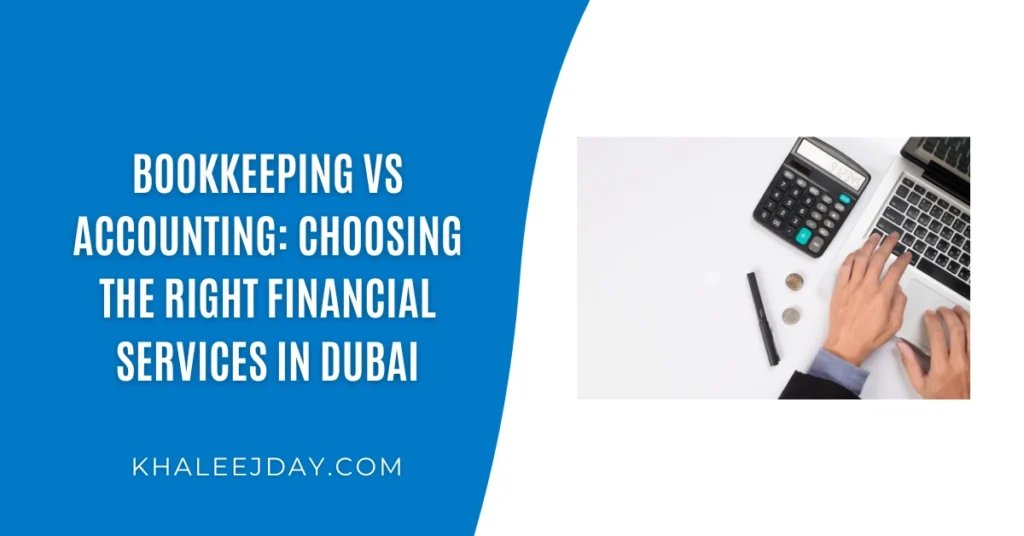Bookkeeping vs Accounting: Choosing the Right Financial Services in Dubai
In the fast-paced and regulation-heavy business environment of Dubai, financial management is more than just a back-office necessity — it’s a foundation for compliance, growth, and decision-making. And yet, many business owners still confuse bookkeeping with accounting, assuming they’re one and the same.

This misconception can lead to underinvestment in key processes, overlooked compliance requirements, and missed opportunities. Especially with the UAE’s introduction of Corporate Tax and its already strict VAT regulations, it’s vital to understand the roles each service plays — and how they work together.
Let’s break it down and explore which service your business really needs (hint: it’s probably both).
What Is Bookkeeping and Who Needs It?
Bookkeeping refers to the process of recording daily financial transactions — income, expenses, invoices, payroll, and more. It forms the operational backbone of your business’s financial records and ensures all your transactions are recorded in a consistent and organized way.
Bookkeeping is especially critical for small and medium-sized businesses (SMEs), where even minor VAT discrepancies or missed entries can result in FTA fines or compliance issues.
For small UAE-based businesses, especially in e-commerce or F&B, setting up reliable day-to-day financial tracking is crucial. That’s where bookkeeping services https://movingo.ae/bookkeeping_services become indispensable — ensuring every transaction is correctly recorded and VAT-ready.
Even in businesses that don’t have a dedicated finance department, having structured bookkeeping can save countless hours during VAT filing, audits, or loan applications.
How Accounting Differs and Adds Strategic Value
While bookkeeping is about what happened, accounting focuses on what it means. It takes those detailed records and translates them into financial statements, cash flow forecasts, and compliance reports that help owners and managers make smarter decisions.
Accounting becomes especially important as your business grows — whether you’re attracting investors, preparing for audits, or optimizing your tax position.
When it’s time to scale or secure funding, accounting services in Dubai helps you make decisions based on clear data — not assumptions.
Accounting also handles:
- Financial modeling for business planning
- Budgeting and strategic forecasting
- Preparing for corporate tax filing and audits
Evaluating business performance over time
It’s the layer that connects operational data with strategic execution.
Bookkeeping vs Accounting
| Feature | Bookkeeping | Accounting |
| Focus | Daily financial transactions | Financial analysis and strategy |
| Needed by | SMEs, freelancers, early-stage firms | Scaling companies, investor-backed startups |
| Tools used | Ledgers, POS, cloud bookkeeping apps | Reporting platforms, forecasting tools |
| Tax impact | Ensures VAT compliance | Enables tax planning and risk management |
| Main value | Accuracy in records | Insight and decision-making support |
Why You May Need Both
Bookkeeping and accounting aren’t interchangeable — but they are deeply interconnected. One builds the foundation, the other creates value from it.
In Dubai’s evolving regulatory landscape, especially with the addition of Corporate Tax, relying solely on one service leaves your business vulnerable. Bookkeeping ensures accuracy and compliance; accounting ensures growth, clarity, and financial readiness.
Our recommendation? Don’t choose one or the other. Choose a provider that offers both — integrated under one team that understands the UAE’s business environment.
FAQ
Do I need both bookkeeping and accounting?
Yes — especially if your business is registered for VAT, planning to grow, or subject to regulatory audits.
Can I outsource both services in Dubai?
Absolutely. Many local firms offer bundled packages to simplify your finances and ensure everything stays aligned and compliant.






